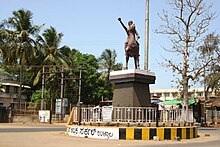Abbakka Rani
| Abbakka Chowta | |
|---|---|
| Rani of Ullal | |

|
|
| Reign | 1525 – ?? 1570s |
| Predecessor | Tirumala Raya Chowta |
| Spouse | Banga Lakshmappa Arasa |
| House | Chowta |
| Religion | Jainism |
Rani Abbakka Chowta was the Queen of Ullal who fought the Portuguese in the latter half of the 16th century. She belonged to the Chowta dynasty who ruled over parts of coastal Karnataka (Tulu Nadu), India. Their capital was Puttige. The port town of Ullal served as their subsidiary capital. The Portuguese made several attempts to capture Ullal as it was strategically placed. But Abbakka repulsed each of their attacks for over four decades. For her bravery, she came to be known as Abhaya Rani (The fearless queen). She was also one of the earliest Indians to fight the colonial powers and is sometimes regarded as the 'first woman freedom fighter of India'. In the state of Karnataka, she is celebrated along with Rani Kittur Chennamma, Keladi Chennamma and Onake Obavva, as the foremost women warriors and patriots.
The Chowtas followed the system of matrilineal inheritance (Aliyasantana) by which Tirumala Raya, Abbakka's uncle, crowned her the queen of Ullal. He also forged a matrimonial alliance for Abbakka with Lakshmappa Arasa, the King of the Banga principality in Mangalore. This alliance was to later prove a source of worry for the Portuguese. Tirumala Raya also trained Abbakka in the different aspects of warfare and military strategy. The marriage, however was short lived and Abbakka returned to Ullal. Her husband thus longed for revenge against Abbakka and was to later join the Portuguese in their fight against Abbakka.
After overrunning Goa and taking control of it, the Portuguese turned their attention southwards and along the coast. They first attacked the South Kanara coast in 1525 and destroyed the Mangalore port. Ullal was a prosperous port and a hub of the spice trade to Arabia and other countries in the west. Being the profitable trading center that it was, the Portuguese, the Dutch and the British vied with one another for control of the region as well as the trade routes. They however, had not been able to make much headway as the resistance from the local chieftains was very strong. The local rulers even forged alliances cutting across caste and religion lines.
...
Wikipedia
